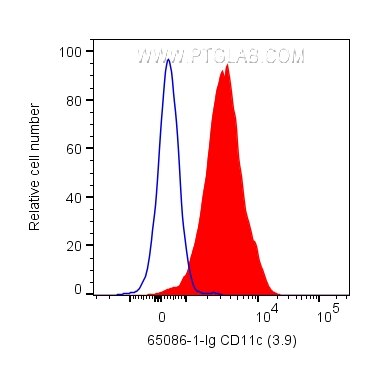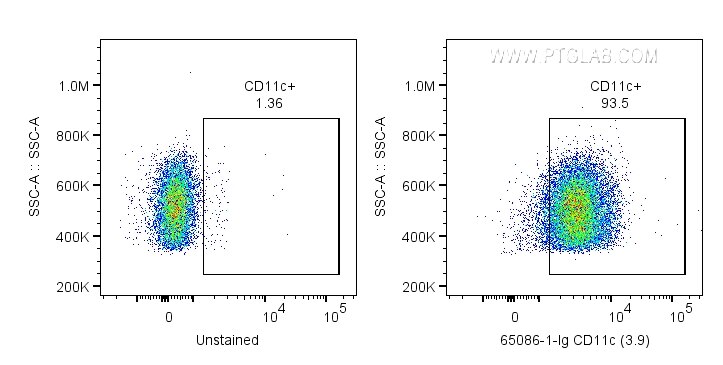Tested Applications
| Positive FC detected in | human PBMCs |
Recommended dilution
| Application | Dilution |
|---|---|
| Flow Cytometry (FC) | FC : 0.2 ug per 10^6 cells in 100 μl suspension |
| This reagent has been tested for flow cytometric analysis. It is recommended that this reagent should be titrated in each testing system to obtain optimal results. | |
| Sample-dependent, Check data in validation data gallery. | |
Product Information
65086-1-Ig targets CD11c in FC applications and shows reactivity with Human samples.
| Tested Reactivity | Human |
| Host / Isotype | Mouse / IgG1, kappa |
| Class | Monoclonal |
| Type | Antibody |
| Immunogen | Rheumatoid synovial cells and human monocytes Predict reactive species |
| Full Name | integrin, alpha X (complement component 3 receptor 4 subunit) |
| Calculated Molecular Weight | 1169 aa, 129 kDa |
| GenBank Accession Number | BC038237 |
| Gene Symbol | CD11c |
| Gene ID (NCBI) | 3687 |
| ENSEMBL Gene ID | ENSG00000140678 |
| RRID | AB_2918389 |
| Conjugate | Unconjugated |
| Form | Liquid |
| Purification Method | Affinity purification |
| UNIPROT ID | P20702 |
| Storage Buffer | PBS with 0.09% sodium azide, pH 7.3. |
| Storage Conditions | Store at 2-8°C. Stable for one year after shipment. |
Background Information
Integrins are cell adhesion receptors that are heterodimers composed of non-covalently associated α and β subunits (PMID: 9779984). CD11c, also known as integrin αX, is a type I transmembrane glycoprotein present on a variety of cells, including monocytes/macrophages, granulocytes, a subset of B cells, NK cells and dendritic cells (PMID: 2897326; 1680915; 1694698; 17389580). As a result of its high level of expression on most dendritic cells, CD11c is typically considered to be a marker of conventional dendritic cells (PMID: 27119555). CD11c forms an α/β heterodimer with CD18 (integrin β2). CD11c/CD18 acts a receptor for fibrinogen and is important in monocyte adhesion and chemotaxis (PMID: 1671533).
Protocols
| Product Specific Protocols | |
|---|---|
| FC protocol for CD11c antibody 65086-1-Ig | Download protocol |
| Standard Protocols | |
|---|---|
| Click here to view our Standard Protocols |





